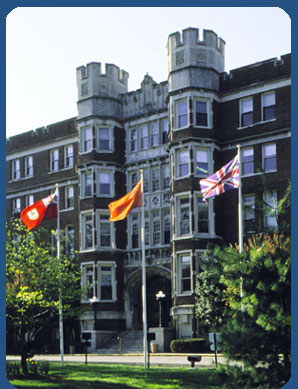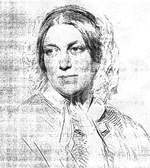| Women's Intellectual Contributions to the Study of Mind and Society Students, as part of an advanced seminar, examined and wrote about the lives of these women,
their intellectual contributions, and the unique impact and special problems that being female had
on their careers. |  |
| For information about referencing this paper - Click Here |
Harriet Martineau
(1802 - 1876)

"Harriet Martineau authored the first systematic methodological treatise in sociology, conducted extended international comparative studies of social institutions, and translated August Comte's Cours de philosophi positive into English, thus structurally facilitating the introduction of sociology and positivism into the United States. In her youth she was a professional writer who captured the popular English mind by wrapping social scientific instruction in a series of widely read novels. In her maturity she was an astute sociological theorist, methodologist, and analyst of the first order. To the extent that any complex institutional phenomenon such as sociology can have identifiable founders, Alice Rossi (1973, 118-124) justly celebrates Harriet Martineau as 'the first woman sociologist.'" (Hill, 290)
Childhood
Harriet Martineau was born in 1802, the sixth of eight children in an upper middle class English family. Her parents were Thomas and Elizabeth (Rankin) Martineau. Thomas was a manufacturer of textiles and an importer of wine in the old cathedral city of Norwich. Norwich was once a distinguished cultural and manufacturing center, but became a casualty of the industrial revolution later in Harriet's life. Thomas's family was considered one of the first families of Norwich, he belonged to an elite literary circle that included Mrs. Barbauld and Amelia Opie. Thomas was a devout Unitarian, a trait that he passed onto his daughter Harriet.
Harriet's mother, Elizabeth was a literate and intelligent woman but had little formal education, making her feel out of place among the cultural elite of Norwich. Harriet described her mother as a domestic tyrant and believed that her tyrannies stemmed from her perceived social inadequacies. But at the same time, it is true that the frugal efficiency and impersonal nature with which she ran her house was characteristic of the 19th century matriarch. Elizabeth enforced in Harriet a fearfulness and feelings of self doubt that would take her years to work out. Harriet described childhood overall as a "burdensome experience" written in Household Education (1849)
No creature is so intensely reserved as a proud and timid child: and the cases are few in which the parents know anything of the agonies of its little heart...It hides its miseries under an appearance of indifference or obstinacy, till its habitual terror impairs its health, or drives it into a temper of defiance or recklessness. I can speak with some certainty of this, from my own experience. I was as timid a child as ever was born.
And though Harriet became deaf later in her life she claimed she had no sense of smell or taste, which some have linked to a traumatic event that blocked it out psychologically. Harriet's mother had turned her over to a wet nurse soon after she was born, which was custom at the time. "The wet nurse hired to suckle the child had concealed from Mrs. Martineau that she had all but ceased lactation" (Pichanick, 6). To make up for this neglect, Elizabeth made milk the staple of Harriet's diet, and though she hated it, could not bring herself to complain,
....and so went for years having the feeling of a heavy lump in her throat for the whole of every morning - sometimes choking with it, and sometimes stealing out into the yard to vomit; and worse than the lump in her throat she had depression of the spirits for the first half of every day, which much injured the action of her mind at lessons and was too much for her temper (Martineau in Household Education p.185)
Though most of her childhood was miserable, Harriet's two sources of joy came from her maternal instinct for her younger brother James and her youngest sister, Ellen. When Ellen was born, Harriet said she would " like to observe the growth of a human mind from the very beginning" ( Pichanick, 5).
Harriet's education was largely at home through self study. She had early exposure to subjects routinely taught only to males. University study was barred to women at the time, but Harriet maintained a regime of intense, self directed investigation throughout her life. When Harriet was about 15 years of age, and her deafness worsening, she was sent by her parents to stay with her aunt and uncle. It was through her uncle that she was introduced to the writings of Locke, Hartley and the principle of sensation. Her uncle was also a minister and reinforced her religious views as a devout Unitarian.
Adulthood
During the 1820's, the Martineau family went into economic decline when Thomas died. Despite the imposing threat of poverty, Harriet felt a sense of freedom in facing the reality of earning her own living. She was able to escape the confines of a middle class Victorian marriage when her fiance, John Hugh Worthington, had a mental and
physical collapse. She had no relationship after this - stating later that "there is a power of attachment in me that has never been touched." She remained single and independent the rest of her life.
Harriet "successfully supported herself as an author in various forms, including essays, tracts, reviews, novels, journal articles, travelogues, biographies, how-to manuals, newspaper columns, histories, children's stories and sociologically informed non-fiction" (Hill, 290).
By 1829 she had decided that decided to commit herself to the profession, writing:
I have determined that my chief subordinate object in life shall henceforth be the cultivation of my intellectual powers, with a view to the instruction of others by my writings. On this determination I pray for the blessing of God...I believe myself possessed of no uncommon talents, and of not an atom of genius; but as various circumstances have allowed me to think more accurately than some women, I believe that I may so write on subjects of universal concern as to inform some minds and stir up others...of posthumous fame I have not the slightest expectation or desire. To be useful in my day and generation is enough for me. (Pichanick, 31)
Harriet's first literary efforts were reverently religious due to her devout Unitarianism. The adoption of Necessarianism by Harriet, however, provided her with the intellectual bridge to a social scientific perspective. In (1832-1834) she abandoned her ecclesiastical dogma and began a relationship with social theory. In this book she used fiction to explicate the principles of the new science of political economy. She lived in London during these years and became part of a very influential and advanced literary circle. The circle included: Charles Babbage, Thomas Carlyle, George Eliot, Florence Nightingale, Charles Dickens, Thomas Malthaus, William Wodsworth, Charlotte Bronte, and Charles Darwin.
Her Writings
In 1834 Harriet began a two year study and visit of the United States. She reported her findings in Society in America (1837) and Retrospect of Western Travel (1838). These empirical studies emerged at the same time as her foundational treatise on sociological data collection, How to Observe Morals and Manners (1838). This book articulated the principles and methods of empirical social research.
Society in America is her most widely known work to sociologists in the U.S., addressing the issues of methodological strategy confronted with ethnocentrism. In this work she compared valued moral principles and observable social patterns, illustrating insightfully the distinctions between rhetoric and reality.
Her writings in How to Observe Morals and Manners offered
a positivist solution to the correspondence problem between intersubjectivity, verifiable observables, and unobservable theoretical issues (Hill, 292).
Before Marx, Engels or Weber, Martineau examined social class, religion, suicide, national character, domestic relations, women's status, criminology, and interrelations between institutions and individuals.
In 1848, after her trip to the Mid-East and the publication of her work: Eastern Life Past and Present, Harriet openly embraced atheism. She lost much of the support in her family, especially her younger brother James, a known cleric at the time. She also received a cold reception in the populous but was supported by her circle of literary friends. William Lloyd Garrison wrote in her support:
I know what you have dared to be brave, what you have suffered, by the frank avowal of what a hireling priesthood and a corrupt church have branded atheistical sentiments. Though my belief in immortality is without peradventure, I desire to tell you that you skepticism, in lack of evidence, on that point, has never altered my confidence in the goodness of your heart and the nobleness of your character...I respect and admire conscientious dissent and doubt...Heresy is the only thing that will redeem mankind. (Pichanick,191)
In 1851 Harriet translated Comte's Cours de philosophie positive into English, facilitating the introduction of positivism into American thought.
Later Life
Harriet Martineau spent her later years away from the bustling streets of London, moving to the serene Lake District. This was a welcome contrast to the years of constant trial and controversy that was characteristic of most of her life.
There is no thorough bibliography of Martineau's reviews and journal articles. During her life, she wrote over 1500 columns, undertook pioneering methodological studies in what is now called sociology. She was forgotten, in sociology, literature, history, and journalism due to the male academic system (Hill 294-295).
She died after years of illness in1876, but, in her usual fashion, had already written her obituary, nearly twenty years before:
Her original power was nothing more than was due to earnestness and intellectual clearness within a certain range. With small imaginative and suggestive powers, and therefore nothing approaching genius, she could see clearly what she did see, and give a clear expression to what she had to say. In short, she could popularize, while she could neither discover nor invent. She could sympathize in other people's views and was too facile in doing so; and she could obtain and keep a firm grasp of her own, and, moreover, she could make them understood. The function of her life was to do this, and, insofar as it was done diligently and honestly, her life was of use, however far its achievements may have fallen short of expectations less moderate than her own. Her duties and her business were sufficient for the peace and the desires of her mind. She saw the human race, as she believed, advancing under the law of progress; she enjoyed her share of the experience, and had no ambition for a larger endowment, or reluctance or anxiety about leaving the enjoyment of such as she had. (Pichanick, 239).
Works Consulted
- Hill, M. R. Women In Sociology "Harriet Martineau" p. 289-297
- Chapman, M. W. (Ed.) Harriet Martineau's Autobiography
Boston, James Osgood, 1877.
- Pichanick, Valerie K. (1980). Harriet Martineau, The Woman and Her Work, 1802-76. University of Michigan Press.
Back to Women's Page

